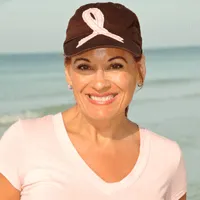
- Share on Facebook5
- Share on Pinterest
- Share on Twitter
If you’ve lived through a cancer diagnosis and treatment, you’ve spent months–or possibly years–worrying about your disease. You’ve done everything you had to do–traveling to one doctor’s appointment after another, undergoing scans and biopsies, and putting your body through the rigors of surgery, chemotherapy, or other treatment regimens.
 Then, your doctor finally gave you the news you’d been waiting for: “You’re cancer-free.” Your first instinct might have been to celebrate your survival and then wash your hands of the whole ordeal and move on. But for many women, a positive prognosis is just a transition from constant surveillance to self-reliance. Instead of fearing that your cancer will progress, your worry becomes–will it return?
Then, your doctor finally gave you the news you’d been waiting for: “You’re cancer-free.” Your first instinct might have been to celebrate your survival and then wash your hands of the whole ordeal and move on. But for many women, a positive prognosis is just a transition from constant surveillance to self-reliance. Instead of fearing that your cancer will progress, your worry becomes–will it return?
Thanks to improved treatments, more people are surviving cancer. A recent study reported in CA: A Cancer Journal for Clinicians estimated that there are 13.7 million cancer survivors–more than half of them women–living in the United States today. Better survival odds make planning for life after cancer almost as important as planning treatment for the disease.
PLANNING FOR LIFE AFTER CANCER
Surviving cancer isn’t an ending. It’s the beginning of a new vigilance–this time to prevent recurrences and control treatment side effects.
Cancer-free does not mean home free, says Dr. Marc Garnick, clinical professor of medicine at Harvard Medical School. “Patients should not equate a full remission with a cure,” he says. Cancer that has been treated can return in the future.
Yet there are many things you can do to reduce the risk of your cancer returning, and enhance your health as you move forward. According to new guidelines from the American Cancer Society (ACS), these steps include:
1. Stay at a healthy weight. If you’re overweight, limit high-calorie foods and exercise more often.
2. Exercise for at least 150 minutes a week. Alternate aerobic exercise with two or more days of strength training.
3. Eat a diet high in vegetables, fruits, and whole grains. Limit processed and red meats and high-fat foods.
EMOTIONAL HEALTH AFTER CANCER
For the last few months or years, all of your efforts and energy have been focused on surviving cancer. Now that the crisis has passed, you may suddenly feel flooded with the emotional consequences of having survived a serious illness.
“A lot of patients ask me, ‘Why am I feeling so horrible now?’ Because they finally have the time and space to process it,” explains Dr. Elyse Park, an associate professor in the department of psychiatry at Harvard Medical School and a clinical health psychologist who treats cancer patients at Massachusetts General Hospital.
You’re also transitioning out of a very structured treatment program. Gone is the constant presence of the doctors and nurses who cared for and looked after you. Less available are the friends and family members who rallied around you when you were sick.
You still need that support now, but outside of a sheltering medical environment it can be harder to find. Many cancer survivors look to organizations such as the American Cancer Society, Lance Armstrong Foundation, and National Cancer Institute, which host support groups and other programs for cancer survivors.
As you return to your day-to-day life, take things slowly.
“I think people should think of it in terms of a process,” says Dr. Park. “Don’t try to jump 100 percent back into what you were.” Gradually transition back into your job, activities, and friendships, allowing yourself time to re-acclimate along the way.
THE FUTURE
Move forward from your cancer, but don’t forget it entirely. Stay on top of your health and follow up with your oncologist as needed to prevent your cancer from coming back. How often you see your oncologist will depend on several factors, including your age, the type of cancer you had, and what treatments you were given–but these visits will likely continue indefinitely.
Be proud that you’ve survived your cancer, but also be realistic. “I think people shouldn’t be lulled by this label of ‘survivor,’ because that can be a heavy label to wear,” Dr. Park says. “Sometimes it takes people a while to get to the point where they’re ready to feel in a way that matches that image.”
– Harvard Women’s Health Watch
(C) 2012. PRESIDENT AND FELLOWS OF HARVARD COLLGE. ALL RIGHTS RESERVED DISTRIBUTED BY TRIBUNE MEDIA SERVICES, INC.
- Share on Facebook5
- Share on Pinterest
- Share on Twitter

